Evangelicals have to do their homework in order to go beyond the surface of mere phonetics in order to grasp the profoundly different theological vision underpinning Francis’ language.
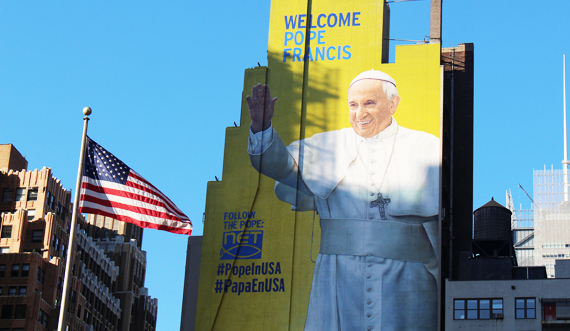 A giant mural in Manhattan (New York) welcoming Pope Francis to the USA. / Ricky H. (Flickr)
A giant mural in Manhattan (New York) welcoming Pope Francis to the USA. / Ricky H. (Flickr)
Pope Francis is one of the most liked leaders in today’s world. In 2014 Time Magazine voted him ‘Man of the year,’ and his popularity is on the increase, especially outside of the Catholic Church. In secular circles, including left-wing thinkers and LGBT movements, many seem to resonate with his apparent approachability and simplicity. With his insistence on mercy, love and tenderness, Francis likes to make his message simple, inclusive and non-judgmental.
Evangelicals are not immune to Francis’s charm and kindness: many are attracted by his seemingly biblical language (e.g. conversion, mission, personal relationship with Jesus) and his less formal type of spirituality. This is just one side of the coin, however. Other descriptions of Francis depict him as a “chess player” due to his Jesuit ability to maneuver in unpredictable ways after establishing a personal relationship with people. Others still consider him a “liberal” due to his apparently universalistic views of salvation for all men in spite of their religion or lack of it. Still others think he is an “anti-capitalist” due to his harsh comments on free-market economies. The overall picture is therefore one of complexity. Wherever you land in your opinion of him, here are five traits essential to understanding Pope Francis.
1. Francis is a very gifted politician
A priest does not climb up the ladder of the Roman Catholic hierarchy and become Pope without having profound political gifts. Francis shares uncanny similarities to President Obama, another extraordinarily talented politician. Obama and Francis both emerged onto the public stage with charm and an amazing ability to communicate. They understand their respective audiences and winsomely communicate their message. They both exude a star power that is magnetic and draws people to them.
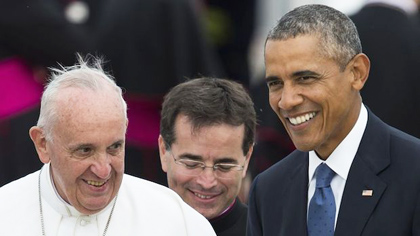 Pope Francis with Barack Obama, during his visit to the USA.
Pope Francis with Barack Obama, during his visit to the USA. There are two important aspects of their common political gift: empathetic listening and reflective communication.
We see Obama’s ability to sympathetically listen to those of vastly different opinions when he was elected President -- of the Harvard Law Review. In a revealing article by Jodi Kantor in the New York Times, before he became a candidate for the U.S. presidency, Obama’s relational political style was described in some detail. The context is important: Harvard Law School at that time was a hotbed of political conflict. Bradford Berenson, a future associate White House counsel in the Bush administration and classmate of Obama explained: “I have worked in the Supreme Court and the White House and I never saw politics as bitter as at Harvard Law Review in the early ’90s.”
Kantor talked to dozens of Obama’s classmates and summarized that they “could not remember his specific views” and that even his closest friends didn’t “know exactly where he stood.” What everyone did remember was Obama’s extraordinary ability to listen to them and make them feel understood. “Obama cast himself as an eager listener, sometimes giving warring classmates the impression that he agreed with all of them at once.” Obama had a surprising ability to connect to the belligerent factions at Harvard Law School and not show his own cards: “People had a way of hearing what they wanted in Obama’s words.” In the midst of one political dustup, Obama calmed the waters and “students on each side of the debate thought he was endorsing their side.” One classmate remembering the incident commented: “Everyone was nodding, Oh he agrees with me”.
Today many evangelicals are experiencing Pope Francis in a similar way: “Oh, he agrees with me.” Hundreds of Evangelical leaders are coming to Rome on a pilgrimage to meet this highly relational Pope. They experience a Pope who is listening to them and who sounds like them. One Pentecostal evangelist gave the Pope a “high five.” An evangelical President of one organization described his two visits to Rome to a small group of evangelical CEOs, “Our world view needs to change. We need to rapidly change our world view. This pope apologized at a Protestant church. No pope has ever gone out of the Vatican and gone to a Protestant church. He is saying join hands.” After talking to Francis, one major evangelical theologian was naive enough to question whether Francis even believed in the category of a Roman Catholic Pope. Evangelical leaders are experiencing the magnetic presence and listening ear of a relationally warm, but gifted and canny politician, who is giving them “the impression that he agreed with all of them at once.”
We see the second element of Obama’s and Francis’s political gift in their common style of communicating; they identify with their audience and therein cause their audience to identify with them. Obama, in the prologue to his autobiography, explains the result of this style “I serve as a blank screen on which people of vastly different political stripes project their own views.” When Obama was emerging as a national candidate, this skill served him well. When he was considering becoming a candidate for the presidency, his closest advisors recommended that he run before he had a detailed Senate voting track record while he could most profitably use his blank screen magnetism. At this moment the same can be said of Francis: He is charming, deflects old ways of thinking, and like the most gifted of politicians, has created “a blank screen on which people of vastly different political stripes project their own views.”
2. Francis is a Jesuit with an Anti-Protestant Slant
Francis is the first Jesuit Pope in history. It is sort of an irony to think that a pope who appears to be close to Evangelicals actually belongs to the religious order that was founded to fight Protestantism. The former soldier Ignatius of Loyola (1491-1566) gathered a group of friends who called themselves The Society of Jesus (Societas Jesu) and eventually they were commissioned by the Pope to stop the spread of Protestantism. Their task was to imitate the strengths of Protestantism, i.e. spiritual depth and intellectual brightness, but to use them as catholic weapons against it. The Jesuit order provided the “alternative” catholic way to the Protestant faith. It comes as no surprise then that the first saint that Pope Francis proclaimed in 2013 was Pierre Favre (1506-1546), a French first generation Jesuit with a “smiling face” who more than others tried to look like a Protestant in order to drive people back to the Roman Church.
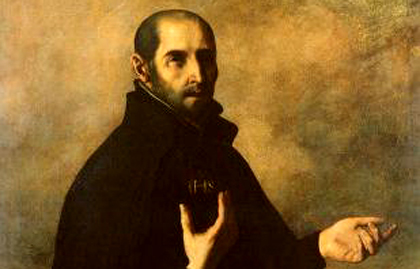 Ignatius of Loyola.
Ignatius of Loyola.Furthermore, the Jesuit side of Pope Francis is clear enough given his published (and never retracted) opinion that Luther and Calvin destroyed man, poisoned society, and ruined the church! In his 1985 lecture on the history of the Jesuit order, he gave severe evaluations of Luther (a “heretic”), and especially of Calvin (a “heretic” and “schismatic”) bringing about the “Calvinist squalor” in society, in the church, and in man’s heart. According to that lecture, Protestantism lies at the root of all evils in the modern West. The fact that this lecture was republished unchanged in 2013 in Spanish and translated in 2014 into Italian with his permission, but without a mitigating word of explanation, indicates that this assessment still lingers in the Pope’s heart and mind. He recently added a harsh comment on the Puritans, falsely associating them with a bigoted and merciless form of Christianity. This friendly Pope to Evangelicals is a Jesuit whose entire mission of order is to defend the Roman Church against Protestantism. Certainly Francis is a smiling Jesuit, but the anti-Protestant still beats in his heart.
3. Francis is Selectively Radical
The third trait addresses Francis’ radicalism. In a recent book Pope Francis’ Revolution of Tenderness and Love (Mahwah, NJ: Paulist Press, 2015) Cardinal Walter Kasper argues that Francis is not a liberal but a radical in the etymological sense of the Latin word “radix,” meaning root or originating principle. According to Kasper, the Pope is challenging the Church to be radical in the sense of re-discovering the roots of the Gospel which are joy, mission, frugality, solidarity with the poor, freedom from legalism, and collegiality.
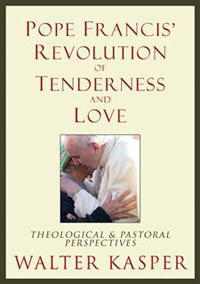 The book authored by Kasper.
The book authored by Kasper.Kasper’s reading of Francis is clever and insightful. It encourages us to move beyond the usual polarizations between “liberals” and “conservatives” within the Church by introducing a third category, that of “radicals.”
Francis appears to be radical on certain issues, but much less so with others. He is radical on poverty, but silent on the massive financial power of his Church. He seems to be radical on mercy, but never mentions original sin and divine judgment over all sinners outside of Christ. He is radical in advocating for simplicity, but keeps the expansive apparatus of an empire of which he is the head. He is radical in denouncing the tragedies of unethical capitalism, but seems to be much less outspoken towards the immoral deviations of one’s personal sexual life. In other words, his radicalism is somewhat selective. Radical in one area, much less so in another.
In a certain sense, “liberals” are radical on social issues, while “conservatives” are radical on doctrinal issues. Everyone is radical in some sense. There are different shades of radicalism. Francis’ radicalism is much closer to the liberal version than the conservative one. Therefore, playing a bit with words, the question is whether or not his radicalism is radically different from a more liberal tendency. Historically speaking, the root of theological liberalism lies in the preference given to religious feelings over doctrinal expressions. And this is exactly what the Pope seems also fond of doing. If mercy and tenderness describe the overall message of Francis, they sound more like liberal catchwords than traditional ones.
4. Francis is a Latin American
Francis comes from Latin America where, over the course of the 20th century, Roman Catholicism lost its religious monopoly, and a full 19% of the continent is now Protestant. The traditional Latin American Roman Catholic response to the numerical growth of Evangelicals has been labeling them as “sects” and “cults,” but this derogatory approach did not stop millions of people from leaving the Catholic Church to join various evangelical churches. The risk of losing the continent has caused the Catholic Church to do something it has never done before, to choose a non-European as Pope, to choose a Latin American as Pope.
Now the Pope himself is directly involved in rescuing the continent, strengthening the Roman Catholic Church and reaching out to evangelicals from the Vatican. His visits to Brazil, Ecuador, Bolivia and Paraguay within the first two years of his papacy are an indication of the importance of this task in his agenda.
Secondly, the influence of Latin America on Francis is visible in his focus on the poor. Latin America was the home of Liberation Theology with its Marxist categories and condemnation of capitalism. Yet even those Latin American Christian leaders who rejected the Marxist analysis, which is embedded in a full blown Liberation Theology, still have often prioritized the poor in their theological thinking and emphasized those passages of scripture which reflect this concern. Francis’ condemnation of Capitalism’s evils has surprised many in the west, but shouldn’t, if one understands Francis’ cultural roots.
5. Francis is an ecumenical leader
Francis is the most ecumenical pope ever. Francis, before his election to the papacy, built relationships with evangelical leaders, attended evangelical conferences in his home country, and regularly visited a Youth with a Mission prayer center for personal prayer. Since he became Pope, Francis has gone to an Italian Pentecostal church and apologized for how Roman Catholics have persecuted Pentecostals and welcomed hundreds upon hundreds of evangelical leaders to the Vatican. What is behind Francis’ extraordinary openness and warmth toward evangelicals?
We find the answer in a fascinating article in the Catholic Herald “The Pope’s great Evangelical gamble”:
Somewhere in Pope Francis’s office is a document that could alter the course of Christian history. It declares an end to hostilities between Catholics and Evangelicals and says the two traditions are now ‘united in mission because we are declaring the same Gospel’. The Holy Father is thinking of signing the text in 2017, the 500th anniversary of the Reformation, alongside Evangelical leaders.
The author explains that the Pope believes that “the Reformation is already over” because the Lutheran World Federation and Vatican’s “Joint Declaration on the Doctrine of Justification” was signed in 1999. In a video recording shown at an evangelical pastors conference in Texas, Francis said, “Brothers and sisters, Luther’s protest is over.”
What is going on here?
The last two Popes, John Paul and Benedict, in response to the 1999 statement, did not announce that the Reformation is over. Benedict, while still leading the Congregation of the Doctrine of the Faith, issued a second official Vatican statement which explained that the Joint statement was inadequate and listed a number of serious differences between the historic Lutheran position and the Roman Catholic position. In short, Benedict explained that the Council of Trent, which condemned protestant / evangelical central convictions as anathema, was still in force.
But Francis is a different kind of Pope. He is not a high powered theologian confronting relativism or clarifying doctrine like a Benedict or a philosopher theologian like John Paul II whose Vatican produced the Roman Catholic Catechism. Yes, Francis is sincere, kind and loving. But Francis is playing good cop to Benedict’s bad cop. Francis is a committed Roman Catholic ecumenical leader, and most importantly, he is doing evangelism in the same way Roman Catholics have evangelized through-out their history. Roman Catholics have extended their influence by absorbing movements, converting kings and using physical force. This last method is no longer a widespread strategy of the Roman Catholic Church. In fact, Francis has apologized for how Roman Catholics have persecuted Pentecostals, indigenous native groups, Waldensians, etc.
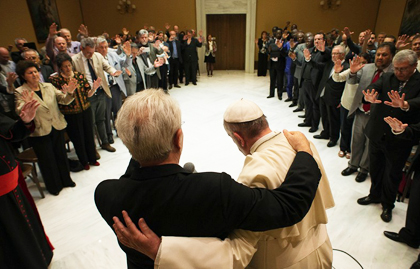 Some evangelical leaders pray with Pope Francis in May 2015.
Some evangelical leaders pray with Pope Francis in May 2015. But the Roman Catholic evangelistic methods of absorbing movements and converting kings are both being actively used by Francis in his present PR campaign toward evangelicals. For example, Roman Catholicism did not reject the Charismatic movement but absorbed it and a new sort of Catholic was created, a “charismatic Catholic.” The Roman Catholic method of absorption is now focused on evangelicalism, seeking to dismiss the differences and emphasize the shared beliefs. Or as the Catholic Herald describes it “The Pope’s great Evangelical Gamble” is Francis’s attempt to “declare an end to hostilities between Catholics and Evangelicals.” Francis is seeking to establish a new sort of Catholic, an “evangelical Catholic.”
The first step toward this broader absorption is the conversion of kings. Over the previous two millennia the Catholic Church has historically extended its influence was by means of converting the kings and queens of political power, and within a generation or two, their kingdoms. This same method is being used today to convert kings of influence. Although a flood of Roman Catholics are becoming evangelicals, there is a trickle of evangelical leaders (kings of influence) converting to Roman Catholicism.
The importance of this should not be underestimated. Evangelicalism is easily the fastest-growing Christian movement in the last century. According to Oxford University Press’s World Christian Encyclopedia, the Roman Catholic Church stagnated with only 6% growth over a century, while evangelicalism grew 20 times as fast with 122% growth as a percentage of the world’s population. The Roman Catholic leaders are aware that millions of Roman Catholics each year are converting to evangelical churches all across the world. When Benedict was still Pope, he gave a lecture in his home country of Germany and expressed confusion of how to respond to the enormous growth of the global evangelical church.
The geography of Christianity has changed dramatically in recent times, and is in the process of changing further. Faced with a new form of Christianity, which is spreading with overpowering missionary dynamism, sometimes in frightening ways, the mainstream Christian denominations often seem at a loss…This worldwide phenomenon- that bishops from all over the world are constantly telling me about- poses a question to us all: what is this new form of Christianity saying to us, for better and for worse? (Source)
But while Benedict seemed confused, Francis is bringing evangelicals close and saying we are the same and the Reformation is over. Francis is not confused or “at a loss” but knows exactly what he is about.
The Siren Call of Unity
In our fragmented and violent world, unity is one of the catchwords that many people are attracted to. Francis is strongly advocating for Christian unity and ultimately the unity of mankind. His passion for unity makes many Evangelicals think that he is the person who may achieve it. Francis developed his idea of ecumenism as a polyhedron. The polyhedron is a geometric figure with different angles and lines. All different parts have their own peculiarity. It’s a figure that brings together unity and diversity.
 A polyhedron.
A polyhedron.Where does this view of unity come from? In pre-Vatican II Roman Catholic ecumenism other Christians were drastically invited to “come back” into the Catholic fold and to conform to its doctrines and practices under the rule of the Pope. With Vatican II (1962-1965), Roman Catholicism updated its ecumenical project and embraced a concentric circle type of unity in which the one and only Church “subsists in” the Roman Catholic church and other churches and communities gravitate around this center according to their degree of nearness or distance from it.
According to Vatican II and subsequent magisterial teachings, Christian unity is threefold:
1. professing the same faith,
2. celebrating the same Eucharist (i.e. the Roman Catholic way), and
3. being united under the same sacramental ministry in apostolic succession (i.e. under the Pope).
How does the polyhedron kind of unity as advocated by Pope Francis fit with this post Vatican II view of unity? For example, as far as the second mark of unity is concerned, is the Pope saying that the sacrificial understanding of the Eucharist and the theology of transubstantiation belong at the center of Christian unity, or are they particulars that can accommodate differences? Or is the Pope saying that apostolic succession, which is the basis of the hierarchical structure of the Roman Catholic Church, is still part of the center, or is it a variable that is secondary to Christian unity?
Polyhedrons are fascinating figures and Francis’ use of the image of a polyhedron is thoughtprovoking. However, the problem for Christian unity does not primarily lie in the metaphors used, but in the theological vision that nurtures it. If the Catholic Eucharist and the Catholic sacramental system are part of the center of Christian unity, one can make reference to spheres or polyhedrons all he likes, but the substance of the problem still remains. The unity proposed by Francis still gravitates around the Roman Catholic Church and its distinct outlook, and not around the biblical Gospel that calls all Christians to conform to the mind of Christ.
Conclusion: How Should Evangelicals Respond to Francis?
An increasing number of Evangelicals say: “I like this pope, he talks about Jesus a lot…” True, Francis knows the language that Evangelicals use (e.g. “conversion”, “mission”, “personal relationship with Jesus”) and is able to articulate it in a winsome way.
The basic rules of interpretation, however, tell us that using the same words does not necessarily mean saying the same things. It is important to understand what Francis means by the words he uses. As already pointed out, in order to understand Francis’ vocabulary one needs to come to terms with Vatican II. This important Council fudged the theological meaning of important key words in order for the Catholic project to be implemented. In his language, for instance, conversion does not mean (what evangelicals mean) turning away from sin to grace, from judgment to pardon, from a state of reprobation to being saved. For Francis, conversion means coming closer to Christ on the assumption that everyone is already in the sphere of his saving grace, though at different distances.
In Francis’ view, all those who follow their consciences are right with God. They may want to convert, i.e. come closer and experience a deeper measure of grace. Moreover, Francis believes that Muslims are brothers and sisters who pray to the same God as Christians do. For them conversion may mean getting deeper in their religious commitments but not necessarily turning away from Islam and embracing faith in Jesus Christ alone. The word “conversion” is the same, but the theological meaning is hugely different.
Take “mission” as another example. In Francis’ vocabulary, mission does not mean going out in the world to proclaim the gospel of salvation in Jesus. It rather means calling people to come closer to the salvation that all people already are part of by being human though in different degrees. For Francis there is no “in or out” sense in this understanding of mission. The whole of humankind is already “in” a state of grace: mission is the task of calling people to engage it deeper, not to call them “in”. They are already “in”. Here again, words are the same but their meaning is vastly different.
Evangelicals have to do their homework in order to go beyond the surface of mere phonetics in order to grasp the profoundly different theological vision underpinning Francis’ language. They may find it surprising how far Francis is from the standard evangelical understanding of the biblical Gospel.
Moreover, in talking about unity, Francis is open to all, be they Christians or non-Christians, religious or secular people. To secular people he says to follow their conscience and they will be fine. Evangelicals are just one piece in his vision. Unity like a polyhedron, means that according to Francis, there are different ways to relate to the Catholic Church, but Rome maintains central stage.
Francis may use similar language, be a nice person, and be passionate about unity. But he is still the Pope of the Roman Catholic Church. The Roman Church, while not being static, nor a monolithic reality, does not really change in its fundamental commitments. It expands itself but does not purify itself. It embraces new trends and practices but does not expel unbiblical ones. It grows but it does not reform itself according to gospel standards.
“What do you think about Pope Francis?” is a pointed question for Evangelicals especially. They seem to be the target of Pope Francis’ efforts towards friendship, reconciliation and unity. Befriending Evangelicals by talking and behaving like them may be a Jesuit way to convert evangelical kings of influence and absorb the Evangelical movement, the fastest growing portion of the Christian world. This is why it is vitally important for evangelicals to know who Pope Francis really is.
Leonardo De Chirico, PhD King's College, is Lecturer of Historical Theology at Istituto di Formazione Evangelica e Documentazione, Padova (Italy); pastor, Breccia di Roma, Rome; Director of the Reformanda Initiative and the Rome Scholars Network, author, Evangelical Theological Perspectives on post-Vatican II Roman and A Christian Pocket Guide to the Papacy. He blogs on Roman Catholic issues from an Evangelical perspective at Vatican Files.
Gregory A. Pritchard, PhD Northwestern University, is President of the Forum of Christian Leaders, Director of the European Leadership Forum, author Willow Creek Seeker Service: Evaluating a New Way of Doing Church.

Las opiniones vertidas por nuestros colaboradores se realizan a nivel personal, pudiendo coincidir o no con la postura de la dirección de Protestante Digital.
Si quieres comentar o